#worker industrial safety and health
Explore tagged Tumblr posts
Text
I really hate how people treat and think about flight attendants. Without getting into the sexism and misogyny of it all, people fundamentally misunderstand their jobs. Flight attendants are not only custom service professionals who serve food and drink. They are first responders. They are trained to fight fires, administer emergency first aid, deal with combative passengers, and help people evacuate the plane. They have a much more dangerous job than police officers—look at their rate of injury and compare that across other private industry. Their job is complex and dangerous and they deserve your respect.
#flight attendants#worker industrial safety and health#this is a marketing problem. if I had photoshop I’d make a bunch of posters about this#I think the reason ppl don’t know is bc airlines don’t want you to think about the dangers of flying#anyway. it really pisses me off#did you know the FAA regulates flight attendant safety and injuries? not OSHA.#and we know the FAA is famously bad at regulation#ugh I’m heated
4 notes
·
View notes
Text
"How much safer has construction really gotten? Let’s take a look.
Construction used to be incredibly dangerous
By the end of the 19th century, what’s sometimes called the second industrial revolution had made US industry incredibly productive. But it had also made working conditions more dangerous...
One source estimates 25,000 total US workplace fatalities in 1908 (Aldrich 1997). Another 1913 estimate gave 23,000 deaths against 38 million workers. Per capita, this is about 61 deaths per 100,000 workers, roughly 17 times the rate of workplace fatalities we have today...
In a world of dangerous work, construction was one of the most dangerous industries of all. By the 1930s and early 1940s the occupational death rate for all US workers had fallen to around 36-37 per 100,000 workers. At the same time [in the 1930s and early 1940s], the death rate in construction was around 150-200 deaths per 100,000 workers, roughly five times as high... By comparison, the death rate of US troops in Afghanistan in 2010 was about 500 per 100,000 troops. By the mid-20th century, the only industry sector more dangerous than construction was mining, which had a death rate roughly 50% higher than construction.
We see something similar if we look at injuries. In 1958 the rate of disabling injuries in construction was 3 times as high as the manufacturing rate, and almost 5 times as high as the overall worker rate.
Increasing safety
Over the course of the 20th century, construction steadily got safer.

Between 1940 and 2023, the occupational death rate in construction declined from 150-200 per 100,000 workers to 13-15 per 100,000 workers, or more than 90%. Source: US Statistical Abstract, FRED
For ironworkers, the death rate went from around 250-300 per 100,000 workers in the late 1940s to 27 per 100,000 today.
Tracking trends in construction injuries is harder, due to data consistency issues. A death is a death, but what sort of injury counts as “severe,” or “disabling,” or is even worth reporting is likely to change over time. [3] But we seem to see a similar trend there. Looking at BLS Occupational Injuries and Illnesses data, between the 1970s and 2020s the injury rate per 100 workers declined from 15 to 2.5.
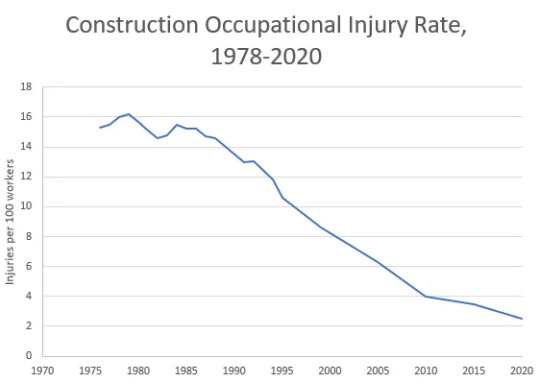
Source of safety improvements
Improvements in US construction safety were due to a multitude of factors, and part of a much broader trend of improving workplace safety that took place over the 20th century.
The most significant early step was the passage of workers compensation laws, which compensated workers in the event of an injury, increasing the costs to employers if workers were injured (Aldrich 1997). Prior to workers comp laws, a worker or his family would have to sue his employer for damages and prove negligence in the event of an injury or death. Wisconsin passed the first state workers comp law in 1911, and by 1921 most states had workers compensation programs.
The subsequent rising costs of worker injuries and deaths caused employers to focus more on workplace safety. According to Mark Aldrich, historian and former OSHA economist, “Companies began to guard machines and power sources while machinery makers developed safer designs. Managers began to look for hidden dangers at work, and to require that workers wear hard hats and safety glasses.” Associations and trade journals for safety engineering, such as the American Society of Safety Professionals, began to appear...
In 1934, the Department of Labor established a Division of Labor Standards, which would later become the Occupational Safety and Health Administration (OSHA), to “promote worker safety and health.” The 1935 National Labor Relations Act (NLRA), which legalized collective bargaining, allowed trade unions to advocate for worker safety.
Following WWII, the scale of government intervention in addressing social problems, including worker safety, dramatically increased.
In addition to OSHA and environmental protection laws, this era also saw the creation of the Consumer Product Safety Commission (CPSC), the National Highway Traffic Safety Administration (NHTSA), and the National Institute for Occupational Safety and Health (NIOSH).
OSHA in particular dramatically changed the landscape of workplace safety, and is sometimes viewed as “the culmination of 60 or more years of effort towards a safe and hazard-free workplace.”"
-via Construction Physics (Substack newsletter by Brian Potter), 3/9/23
#construction#osha#workplace#workplace safety#workers rights#labor rights#occupational health#nlra#collective bargaining#united states#us history#labor unions#industrial revolution#this is why unions and regulations are so fucking important by the way#if you have not studied late 1800s and early 1900s labor history in the US#you really can't grasp how incredibly dangerous things used to be#and how much proof we have that corporations suck#government regulations
90 notes
·
View notes
Text
i think all business owners should have to spend 50% of their work week doing the actual job they're supposedly overseeing. since it's all apparently so easy, and they could do so much better. and also then kill themselves.
#people will buy a company that's part of the public health and safety sector and go 'lol is anyone going to gut this industry like a fish?'#and not wait for an answer. while using stupid baseball movie metaphors.#<- vince that seems like a really weird thing to be annoyed about#i need you all to understand that the owners of my company do not like baseball.#they spent an entire meeting talking in baseball metaphors they don't understand because they felt it made them seem personable#because they're fucking econ majors who seem to view the world entirely as a game where if they press the right buttons#they'll unlock the 'loyalty and devotion' setting in their workers and profits will soar through the roof#which simply CAN'T be that hard to do. since we're all dumb hicks who never went to college (to get a REAL degree)#just throw enough fishing/sports/camping metaphors out at us and surely we'll be won over.#sorry work has been. irritating. lately.
9 notes
·
View notes
Text
YESSSS Hot Labor Summer!
#I love you unionized VFX workers#get your money and safety and health back and protections and reasonable timelines for movies#better MCU that stands the test of time#better experiences for the actors#better reputation in the industry#All starts here#marvel#unions
5 notes
·
View notes
Text
Key takeaways.

Summarizing examples of existing responses to these hazards, such as policies and strategies, laws, collective agreements, technical guidelines, training and advisory initiatives, awareness raising campaigns and workplace level actions.




#Advocacy#worker's safety#worker's health#unfccc#Global framework for chemicals#osh policies#green industries#green technologies#OSH hazards#climate change mitigation#climate health nexus#workers#climate change#changing climate#ILO#international labour organization
0 notes
Text
Promoting Mental Health on Construction Sites
Promoting mental health on construction sites is an increasingly important aspect of workplace safety and wellness. This article will explore why focusing on mental health is crucial in the construction industry and how to effectively implement strategies for promoting mental health on construction sites. Understanding the Need for Mental Health Awareness in Construction Promoting mental health…
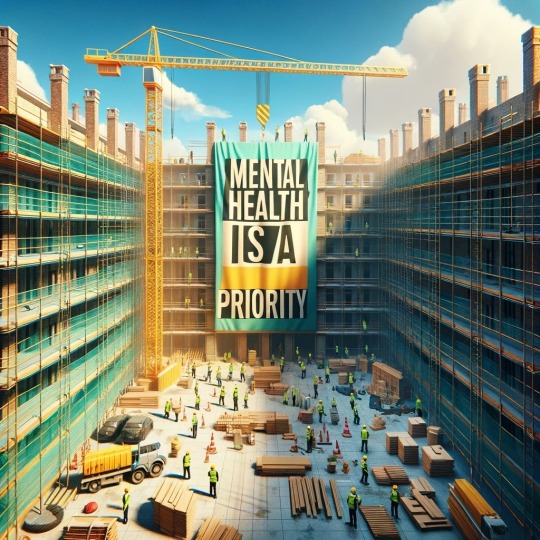
View On WordPress
#construction industry#Construction Safety#employee well-being#health and safety#leadership#Mental Health Advocacy#mental health awareness#Stress Management#Worker Support#Workplace Wellness
0 notes
Text
🗣️THIS IS WHAT INCLUSIVE, COMPASSIONATE DEMOCRACY LOOKS LIKE
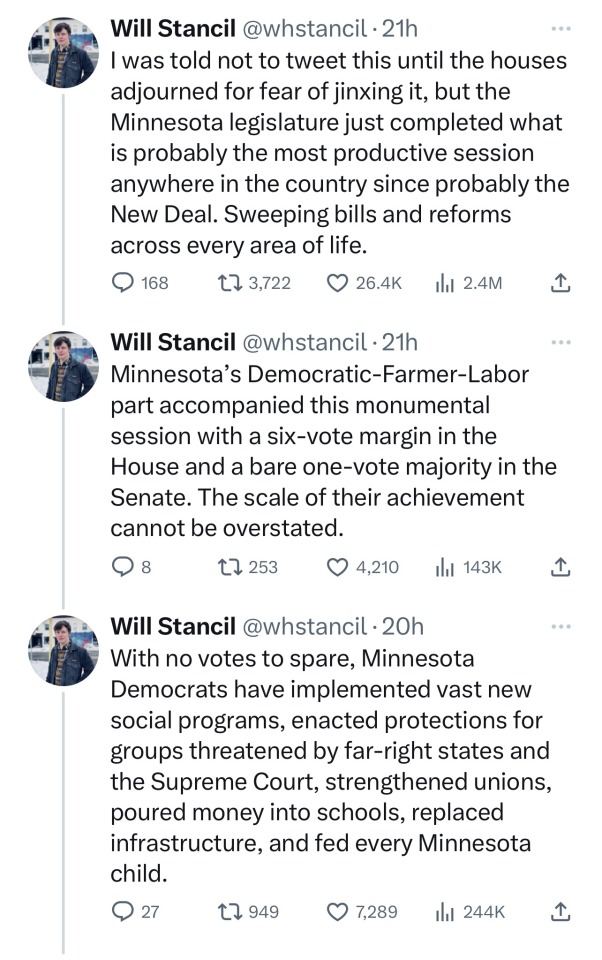
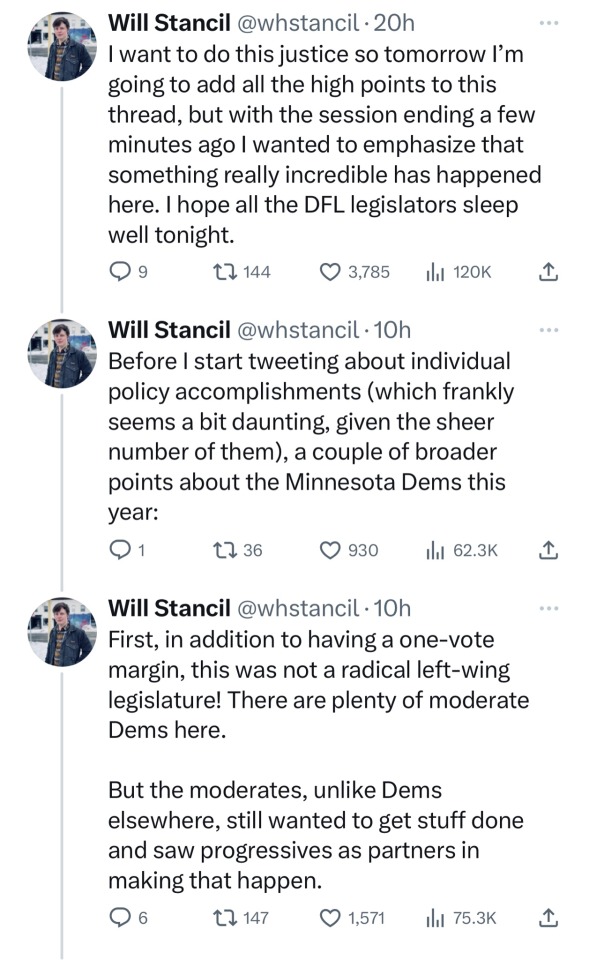
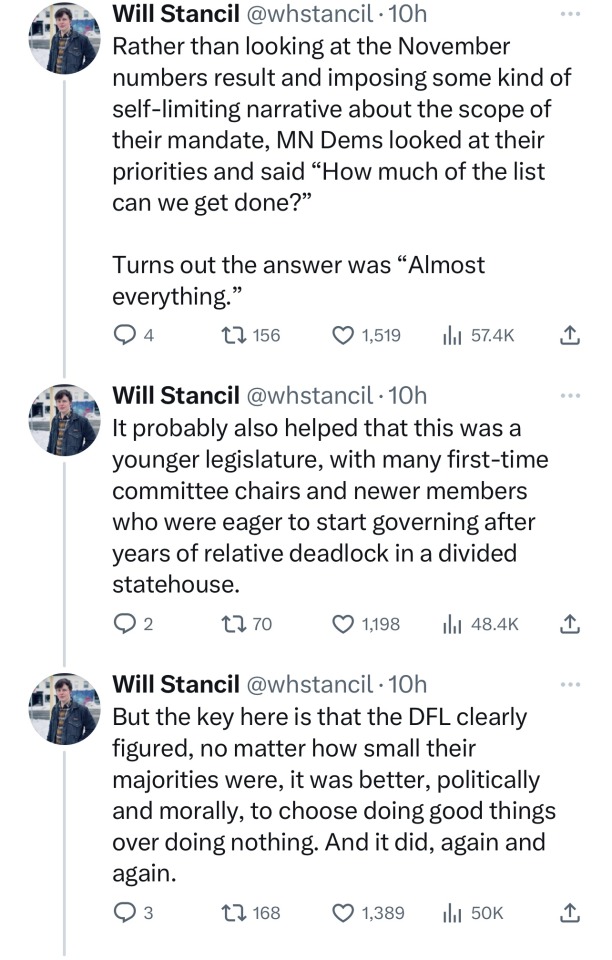
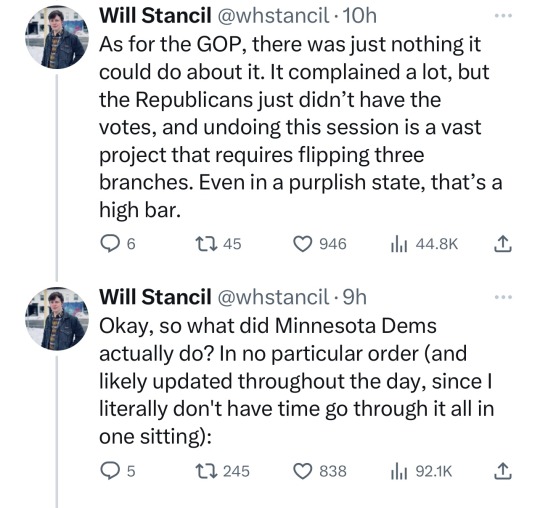
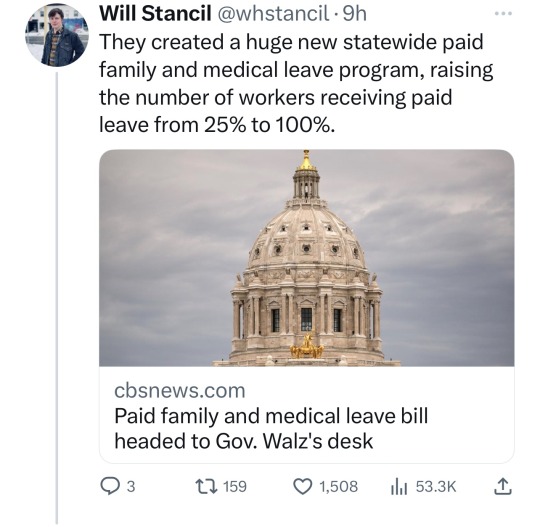
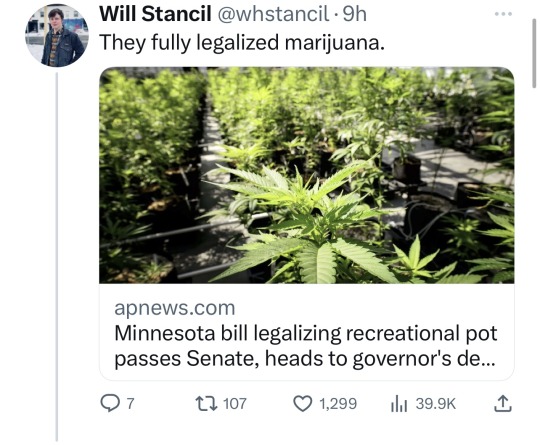

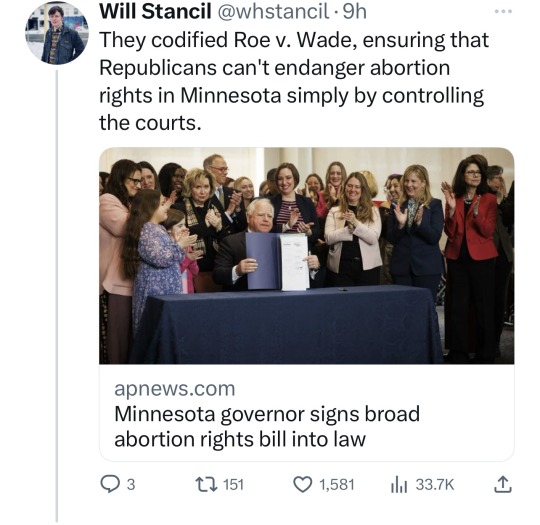

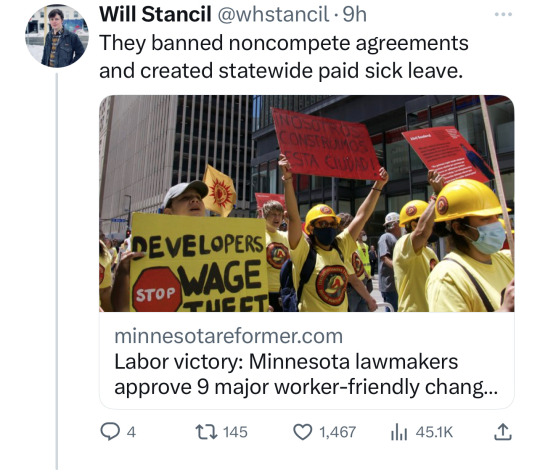
Minnesota Dems enacted a raft of laws to make the state a trans refuge, and ensure people receiving trans care here can't be reached by far-right governments in places like Florida and Texas. (link)
Minnesota Dems ensured that everyone, including undocumented immigrants, can get drivers' licenses. (link)
They made public college free for the majority of Minnesota families. (link)
Minnesota Dems dropped a billion dollars into a bevy of affordable housing programs, including by creating a new state housing voucher program. (link)
Minnesota Dems massively increased funding for the state's perpetually-underfunded public defenders, which lets more public defenders be hired and existing public defenders get a salary increase. (link)
Dems raised Minnesota education spending by 10%, or about 2.3 billion. (link)
Minnesota Dems created an energy standard for 100% carbon-free electricity by 2040. (link)
Minnesota already has some of the strongest election infrastructure (and highest voter participation) in the country, but the legislature just made it stronger, with automatic registration, preregistration for minors, and easier access to absentee ballots. (link)
Minnesota Dems expanded the publicly subsidized health insurance program to undocumented immigrants. This one's interesting because it's the sort of things Dems often balk at. The governor opposed it! The legislature rolled over him and passed it anyway. (link)
Minnesota Dems expanded background checks and enacted red-flag laws, passing gun safety measures that the GOP has thwarted for years. (link)
Minnesota Dems gave the state AG the power to block the huge healthcare mergers that have slowly gobbled up the state's medical system. (link)
Minnesota Dems restored voting rights to convicted felons as soon as they leave prison. (link)
Minnesota Dems made prison phone calls free. (link)
Minnesota Dems passed new wage protection rules for the construction industry, against industry resistance. (link)
Minnesota Dems created a new sales tax to fund bus and train lines, an enormous victory for the sustainability and quality of public transit. Transit be more pleasant to ride, more frequent, and have better shelters, along more lines. (link)
They passed strict new regulations on PFAS ("forever chemicals"). (link)
Minnesota Dems passed the largest bonding bill in state history! Funding improvements to parks, colleges, water infrastructure, bridges, etc. etc. etc. (link)
They're going to build a passenger train from the Twin Cities to Duluth. (link)
I can't even find a news story about it but there's tens of millions in funding for new BRT lines, too. (link)
A wonky-but-important change: Minnesota Dems indexed the state gas tax to inflation, effectively increasing the gas tax. (link)
They actually indexed a bunch of stuff to inflation, including the state's education funding formula, which helps ensure that school spending doesn't decline over time. (link)
Minnesota Dems made hourly school workers (e.g., bus drivers and paraprofessionals) eligible for unemployment during summer break, when they're not working or getting paid. (link)
Minnesota Dems passed a bunch of labor protections for teachers, including requiring school districts to negotiate class sizes as part of union contracts. (Yet another @SydneyJordanMN special here. (link)
Minnesota Dems created a state board to govern labor standards at nursing homes. (link)
Minnesota Dems created a Prescription Drug Affordability Board, which would set price caps for high-cost pharmaceuticals. (link)
Minnesota Dems created new worker protections for Amazon warehouse workers and refinery workers. (link)
Minnesota Dems passed a digital fair repair law, which requires electronics manufacturers to make tools and parts available so that consumers can repair their electronics rather than purchase new items. (link)
Minnesota Dems made Juneteenth a state holiday. (link)
Minnesota Dems banned conversion therapy. (link)
They spent nearly a billion dollars on a variety of environmental programs, from heat pumps to reforestation. (link)
Minnesota Dems expanded protections for pregnant and nursing workers - already in place for larger employers - to almost everyone in the state. (link)
Minnesota Dems created a new child tax credit that will cut child poverty by about a quarter. (link)
Minnesota Democrats dropped a quick $50 million into homelessness prevention programs. (link)
And because the small stuff didn't get lost in the big stuff, they passed a law to prevent catalytic converter thefts. (link)
Minnesota Dems increased child care assistance. (link)
Minnesota Dems banned "captive audience meetings," where employers force employees to watch anti-union presentations. (link)
No news story yet, but Minnesota Dems forced signal priority changes to Twin Cities transit. Right now the trains have to wait at intersections for cars, which, I can say from experience, is terrible. Soon that will change.
Minnesota Dems provided the largest increase to nursing home funding in state history. (link)
They also bumped up salaries for home health workers, to help address the shortage of in-home nurses. (link)
Minnesota Dems legalized drug paraphernalia, which allows social service providers to conduct needle exchanges and address substance abuse with reduced fear of incurring legal action. (link)
Minnesota Dems banned white supremacists and extremists from police forces, capped probation at 5 years for most crimes, improved clemency, and mostly banned no-knock warrants. (link)
Minnesota Dems also laid the groundwork for a public health insurance option. (link)
I’m happy for the people of Minnesota, but as a Floridian living under Ron DeSantis & hateful Republicans, I’m also very envious tbh. We know that democracy can work, and this is a shining example of what government could be like in the hands of legislators who actually care about helping people in need, and not pursuing the GOP’s “culture wars” and suppressing the votes of BIPOC, and inflicting maximum harm on those who aren’t cis/het, white, wealthy, Christian males. BRAVO MINNESOTA. This is how you do it! And the Minnesota Dems did it with a one seat majority, so no excuses. Forget about the next election and focus on doing as much good as you can, while you still can. 👏🏿👏🏿👏🏿👏🏿👏🏿👏🏿👏🏿
👉🏿 https://threadreaderapp.com/thread/1660846689450688514.html
#politics#minnesota#social justice#culture wars#this is what democracy looks like#republicans are evil
25K notes
·
View notes
Text
Match your skills to the most in-demand job roles in Industrial Safety Sector. Join our Industrial Safety course, a tailor-made course to meet these requirements by enhancing the core competencies of students. Learn HSE requirements that are covered from a wide spectrum of international and national legislation.
Skills you will learn:
Outstanding Organizational Skills
Excellent Communication Skills
Attention to detail
Working of Safety Management Information System
Knowledge of potentially hazardous materials or practices
Become A:
HSE Engineer
Pollution Control (Air, Water, and Soil) Officers
Environmental Protection Engineer
Consultant in HSE
HSE Audit Officer/Engineer
Industrial Safety Auditor
#industrial sector#industrial safety#workers safety#health and safety#safety training#safety first#industrial training#industrial equipment
1 note
·
View note
Text
As the West's drought eases, this area remains in the worst on record — and it's hitting farmers hard | CNN
CNN — Cate Casad started noticing the for-sale signs pop up over the last year on farms around Central Oregon, which has been mired in water shortages amid a yearslong megadrought. Casad and her husband, Chris, are first-generation farmers and ranchers who started off with just a few acres of land east of Bend, then moved north in 2017 to scale up their farm. Now, the couple manages around…

View On WordPress
#accidents#Agriculture#and commercial fishing#brand safety-nsf accidents and disasters#brand safety-nsf sensitive#Business#business and industry sectors#continents and regions#disasters and safety#domestic alerts#domestic-health and science#domestic-us news#Droughts#economy and trade#energy and utilities#environment and natural resources#farm workers#forestry#iab-agriculture#iab-business and finance#iab-disasters#iab-environment#iab-industries#iab-power and energy industry#iab-science#iab-weather#international alerts#international-health and science#international-us news#labor and employment
0 notes
Text
More good things the Biden administration is doing: OSHA heat safety rules for workers
Remember when Texas and Florida passed laws preventing local and municipal governments from implementing their own heat safety rules and said that if heat is such a big problem, OSHA should make rules that apply to everyone? If not, NPR can remind you. OSHA has now accepted the challenge, moving much faster than they usually do:
OSHA National News Release U.S. Department of Labor July 2, 2024 Biden-Harris administration announces proposed rule to protect indoor, outdoor workers from extreme heat WASHINGTON – The U.S. Department of Labor has released a proposed rule with the goal of protecting millions of workers from the significant health risks of extreme heat. If finalized, the proposed rule would help protect approximately 36 million workers in indoor and outdoor work settings and substantially reduce heat injuries, illnesses, and deaths in the workplace. Heat is the leading cause of weather-related deaths in the U.S. Excessive workplace heat can lead to heat stroke and even death. While heat hazards impact workers in many industries, workers of color have a higher likelihood of working in jobs with hazardous heat exposure. “Every worker should come home safe and healthy at the end of the day, which is why the Biden-Harris administration is taking this significant step to protect workers from the dangers posed by extreme heat,” said Acting Secretary of Labor Julie Su. “As the most pro-worker administration in history, we are committed to ensuring that those doing difficult work in some of our economy’s most critical sectors are valued and kept safe in the workplace.” The proposed rule would require employers to develop an injury and illness prevention plan to control heat hazards in workplaces affected by excessive heat. Among other things, the plan would require employers to evaluate heat risks and — when heat increases risks to workers — implement requirements for drinking water, rest breaks and control of indoor heat. It would also require a plan to protect new or returning workers unaccustomed to working in high heat conditions. “Workers all over the country are passing out, suffering heat stroke and dying from heat exposure from just doing their jobs, and something must be done to protect them,” said Assistant Secretary for Occupational Safety and Health Douglas L. Parker. “Today’s proposal is an important next step in the process to receive public input to craft a ‘win-win’ final rule that protects workers while being practical and workable for employers.” Employers would also be required to provide training, have procedures to respond if a worker is experiencing signs and symptoms of a heat-related illness, and take immediate action to help a worker experiencing signs and symptoms of a heat emergency. The public is encouraged to submit written comments on the rule once it is published in the Federal Register. The agency also anticipates a public hearing after the close of the written comment period. More information will be available on submitting comments when the rule is published. In the interim, OSHA continues to direct significant existing outreach and enforcement resources to educate employers and workers and hold businesses accountable for violations of the Occupational Safety and Health Act’s general duty clause, 29 U.S.C. § 654(a)(1) and other applicable regulations. Record-breaking temperatures across the nation have increased the risks people face on-the-job, especially in summer months. Every year, dozens of workers die and thousands more suffer illnesses related to hazardous heat exposure that, sadly, are most often preventable. The agency continues to conduct heat-related inspections under its National Emphasis Program – Outdoor and Indoor Heat-Related Hazards, launched in 2022. The program inspects workplaces with the highest exposures to heat-related hazards proactively to prevent workers from suffering injury, illness or death needlessly. Since the launch, OSHA has conducted more than 5,000 federal heat-related inspections. In addition, the agency is prioritizing programmed inspections in agricultural industries that employ temporary, nonimmigrant H-2A workers for seasonal labor. These workers face unique vulnerabilities, including potential language barriers, less control over their living and working conditions, and possible lack of acclimatization, and are at high risk of hazardous heat exposure.
#biden harris administration#biden administration#osha#heat safety#worker safety#biden 2024#biden harris 2024#vote for democrats#vote blue#vote biden#us politics#us law
982 notes
·
View notes
Link
Is it true that factories became common only after all the rich men in England discovered that women and children could work for 25 hours a day without dying or becoming deformed? Was tending machines at the factory just like working out at a gym except you got paid for it? In this part, Part 7 of The Industrial Revolution, discover the advantages and disadvantages of the Factory System, child labor, and a new concept of time which arose from it.
#Jerome ArkenbergHistory Waits For No OneHistoryFactoryFactoriesIndustrializationIndustrial RevolutionWorkersFactory WorkersWork SafetyHealth#Factory#Factories#Industry#Industrialization#Industrial Revolution#Workers#Factory Workers#Work Safety#Health#Health Hazards#Child#Children#Child Labor#Factory Housing#Factory Gate#Shifts#Factory Shifts#Worker Shifts#Shift Change#Factory Hours#Sabbath#Sunday#Childhood#Noon Whistle
0 notes
Text
well all i can say about HBO's anti-union message in that bts video is that AS A KIWI ACTOR/STAGE/SCREEN INDUSTRY WORKER who isn't being strongarmed by a corporation into saying shit that they agree with
the hobbit laws suck. peter jackson is universally despised. what that man did with warner brothers and the national government to make our laws worse for workers so he could film his bad films here in the late 00s is akin to several crimes.
we WANT union protection! we WANT to be able to strike! i'm a member on the Equity NZ (union akin to SAG-AFTRA) committee for Wellington and the amount of work that's going on behind the scenes at the moment to claw back worker protections from our fucked up local laws is immense.
most of us aren't allowed to strike. most people working at wētā (the big screen production house), as well as on most screen/stage jobs are employed as contractors, so they're taxed exorbitantly, have no sick leave, have no holidays, have minimal protection from harassment or being taken advantage of.
long hours? being burned out? that's the kiwi way of living in the screen/stage industry and it SHOULD NOT be celebrated.
The Screen Industry Workers Act of 2022 has fixed some of that but there's still so much to go. yknow how SAG-AFTRA is fighting over residuals? here, we don't even know her.
i know all this personally and intimately.
i was taxed 39% on my contractor income last year.
only now that i'm a salaried worker can i afford to get my teeth fixed.
i had to get a legal action from a lawyer from ANOTHER UNION to get paid for one of my contracts in 2021 because the production team didn't like how i spoke up about their lax health and safety rules (this was a contract I was nominated for one of the most prestigious awards in the country for my work on, fyi)
sexual harassment is rife. what support is there? basically none. we hope it comes out in the media, or it doesn't change and there's nothing we can do cause we'll get sued into oblivion.
ive worked multiple 12+ hour days with only a tiny break in the middle or none at all. friends of mine have done 10-16 hour night shoots.
i've burned myself out multiple times in five years of professional practise cause that's the expected thing. that's what you do. if you're not working at 150% the entire time then you're a bad arts industry employee.
in conclusion, fuck off with your anti-union message, fuck you for utilising our weak-ass laws and HBO i'm in your walls
if you're in the US, support the Entertainment Community Fund! if you're a screen/stage worker in NZ, join Equity!
3K notes
·
View notes
Text
Anti-mask policies and decision makers are using the momentum of anti-masking in the context of covid to also prevent people from accessing or using respirators to protect their breathing and lungs from other hazards -- things that were accepted in many industries as standard safety protocols before 2020.
"“During his first week, Complainant started coughing up black phlegm, his throat and tongue would burn, and he began having breathing problems due to excessive smoke and fumes from the cupola. He notified Sturgeon but nothing changed, and he was not provided a respirator.”
After not receiving a respirator, the lawsuit said the man went to the dispensary room and picked up a respirator himself.
He wore the respirator for the next week until the lawsuit said the safety supervisor saw him wearing it and “immediately became very upset; he rudely admonished the Complainant in front of his co-workers for wearing the respirator and demanded that he take it off immediately.”
According to the lawsuit, he told the safety supervisor he did not feel safe doing his job without it and was pulled into a meeting the next day where he was told he would not be allowed to wear a respirator.
...
After the meeting, the complaint said he was assigned to shovel gravel for the day before going home for the weekend at the end of his shift. On Monday, his employment was terminated.
The Occupational Safety and Health Administration (OSHA) opened an investigation into the company after learning of the alleged retaliation, and the DOL said in a statement that OSHA investigators with the Whistleblower’s Protection Program found the company violated federal protections by terminating the employee who exercised their protected rights to request protective equipment."
4K notes
·
View notes
Text
TIL’ WE MEET AGAIN | Young!Silco x Fem!Reader
Chapter One-Persistence; When a coward turns hero.
Warnings; Angst, pre-canon, hurt/comfort, Zaunites, Piltians, revolution, violence, blood, gore, drinking, smoking, gambling, swearing, sex, brothels, drugs, slow burn, the reader is a coward at first, original character (Wynn), strangers to lovers, bittersweet, Old Silco being weirdly sentimental, Jinx being noisy, and major character death.
A/N; I don’t do taglists, sorry. I also want to thank my friend for supporting my writing, proofreading, and character creation of Wynn. Love you, bro.
PREVIOUS CHAPTER | NEXT CHAPTER | MASTERLIST


Undercity is considered an industrial stain nestled beneath the grand city of Piltover.
With air that hangs heavy, and its people feral. Towering smokestacks belch black smoke into the already smog sky, casting long shadows over the cramped alleyways and buildings. The streets are strewn with discarded scrap metal, chemical waste, and other debris of the relentless production that drives the Undercity's economy.
The warm green glow of the gas lamps casts an eerie, shimmering light over the buzzing market stalls and their wares. Cautious eyes dart about, gripping the crate tightly, as your knuckles white with tension. You trudge through the damp, uneven cobblestone path. Your heavy boots thud, but the market muffles the sound. Wynn strides ahead of you, his boysenberry hair reflecting the green making his hair almost black.
Both of you carry large, sloshing crates of alcohol that clink and bounce with each jostle from the crowded lane. Your tattered cloak draped your form, the hood pulled low to fight against the season's coldness and obscure your face from the lingering enforcers.
You instinctively glance at the enforcers standing near a stall, their voices raised in angry conversation with the stall’s owner, who appears equally irritated. They are likely issuing citations for illegal imports or contraband. Detailed by the other armored man holding up a list and pointing at the merchandise. However, when the vendor suddenly shoves one of them, you quickly avert your gaze, choosing to ignore the escalating commotion and focus on navigating the crowded marketplace.
Fighting wasn’t something you could do against the enforcers unless you’d want a hefty prison sentence or killed. So, you allow them to conduct their inspections and searches, gritting your teeth if their hands linger on your body for far too long.
You did dream of something better, a fictional land where all is peace and harmony, but that's wishful thinking. Life gave the Undercity people the short end of the stick, so now all you want is to keep your life, provide some aid to wanders, and of course keep the tavern: The Last Drop. Afloat.
Some vendors attempt to grab your attention, but you politely shake your head. Keep your eyes trained on Wynn who glides through the people with ease. You stumble and slip between people straining to keep up with your friend. Cursing under your breath at the fact that you could’ve gotten your supply runner to fetch the cargo, but no. Coins have been getting slimmer and slimmer at the drop. One of the many reasons why your resentment, once directed at the enforcers, began to shift towards the rebels who fought against them. While their cause was just, their tactics often made life even harder for the ordinary citizens of the Undercity. Strikes, protests, and their thievery disrupted supply lines which left families and businesses like yours struggling to make ends meet. Of course, this is only rooted in fear.
Fear of losing more.
The mines that delve deep into Runeterra. Extracting precious minerals to fuel the insatiable demand. Workers in harsh conditions, their health and safety were often sacrificed for the sake of profit. Stark contrasts the cutting-edge innovation of Piltover ‘coexisting’ with the rampant corruption and exploitation they cause the city below them.
Down in the fissures, where deep cracks in the earth have split open, a treacherous underground network of tunnels and caverns caused by the relentless mining and drilling operations. Was bustling with the activity of workers, faces smeared with grime.
You and your father worked in those mines, and many families did. Your life narrowed down to one moment. A vivid horrible memory. You knew you should’ve put up a fight, and struggled against the enforcers alongside the others. When the tears finally spilled over, streaming down your face in hot, bitter rivulets. You couldn’t help but cower. You remember his body and the way the world seemed to tilt and spin around you.
When you pushed yourself up, letting go of a rusty pickaxe. A strong arm shoved you roughly back to the ground. It sent shockwaves through your malnourished body. Your coal-covered glove scraped against the unforgiving, rocky ground as you trembled uncontrollably, shaking like a frightened animal.
A cacophony of screams and desperate cries pierced everyone's ears like shards of glass. Through ‘The Gray’ smog you saw people–workers–were fighting against the enforcers with a fury born of desperation, their voices raw as they tried to reach your father, who was knelt on the ground, clutching the back of his head. Blood, vivid red against the rocks, drips steadily from his fingers, staining the earth beneath him. A macabre work of art. The sight of it sears itself into your mind, something you still see to this day.
Your wide eyes locked onto your father, drinking in every detail of his face, committing it to memory, as the screams and shouts faded into a distant, muffled hum.
He met your gaze, his expression was steady and calm despite the chaos that raged around you. He's trying so hard not to look frightened, putting on a brave face for your sake. He gulped, and in that tiny gesture, you saw the truth of his fear reflected in his eyes. But there's something else there too, a silent message of love and reassurance that told you that everything will be okay, that he'll protect you no matter what happens to him.
But the man behind him, the one through the smog, the one who raises his gun high above his shoulder–tells a different story. The gun glints harshly reflecting off the gold on the enforcer. Quick to get to your knees, a firm kick sends you forward along with a harsh boot on your back keeps you in place. You cried out at the pressure, as you squirmed to get closer to your father.
It's a swift blow, brutally efficient in its execution. The butt of the gun connected with the back of his head with a nauseating crack, and he crumpled to the ground. He fell face-first onto the unforgiving rocks. His body would twitch, but the last sliver of life drained away in an instant. You barely heard the final, choked-off words that he never got to finish. His last confession of "I love you" was stolen away by the cruel hand of fate.
Your breathing gets heavy when you remember, each intact a painful reminder of the life that still flows through your veins, even as everything else feels cold and numb. You shakily grip the case. It takes a special kind of strength, and true courage to stand up despite others bringing you down, to crush your hopes and dreams beneath the weight of their fears and insecurities.
You're not sure what you believe in anymore. That day the foundations of your world were shaken when the very ground beneath your feet shifted and crumbled, leaving you feeling lost and adrift in a sea of uncertainty before you were taken by the hand and brought up to a raft. You’ll always be grateful to Wynn. Though, all you know is that life is rather unfair, especially in the Undercity, and all you want to do is survive. Is that selfish?
Perhaps you are one of those pushovers.
You were too lost in thought when you got pushed to the side, sending you to your left, and letting go of the crate to catch your fall, gritting your teeth you look up but notice it’s those same enforcers now carrying off that vendor's supplies. The one that shoulder checks you, gives you a look, and even with its helmet on you can tell that they’re testing your reaction. You look down at your crate. It’s open and bottles–thankfully not broken–have rolled out.
Maybe you've always been that way, content to let others make the decisions, to follow the path of least resistance rather than forging your way forward. But with the aftermath of your father's lifeless body that laid before you and the weight of powerlessness bearing down on your shoulders, you can't help but wonder if there isn't more to you than that.
Maybe, deep down, buried beneath the layers of fear and self-doubt, there is a spark of courage waiting to be ignited, a flicker of determination that just needs the right circumstances to flare into life.
You carefully lift each bottle to the crate, ensuring they are securely packed. Reaching for a bottle of scotch, your hand accidentally brushes against its neighbor, sending the bottle rolling away. It clicks and clanks across the cobblestone path before disappearing into the shadows of a nearby alley.
You pause, considering whether to retrieve the wayward bottle, but the risk of Wynn ringing your neck for wasting good money has you sighing. A broke bitch during inflation is someone you don’t want to mess with. You continue to pack the remaining bottles and get back to your feet, crate in arms.
No one notices you entering the alley, with your head hanging low.
The ground is littered with discarded metal scraps, used needles, and unidentifiable substances. Peering from beneath your hood, you scan the area for any sign of the missing bottle, but your search becomes useless. Instead, you hear labored breathing and pained grunts from further down the narrow way.
Your breath catches in your throat as you take in the scene before you. The glint of gold and blue uniforms mingles with the tattered red of the man's clothing. The sight is all too familiar. The enforcers’ figures huff up and down, laughing at each other in cruel satisfaction as they rain down blows on the man. Their boots connected with sickening thuds against his bloodied body. You can’t tear your eyes away from them.
The right circumstance is all someone needs.
“Look at you, pathetic like the rest of those revolutionaries. You’re nothing but a filthy rat scurrying in the gutters and trash of refined people.” One of them coo, tilting their head at the body, you step closer.
You should move on, and let them take this man’s life if need be, so you can slip by unnoticed. It would be far more understandable than helping someone out of the kindness of your heart, but you have never felt such a surge of emotion before. The impending doom that bloomed in your gut yelling in your ear with a booming voice telling you that if you didn’t help this man you’d truly be the vermin that topside thinks you are. You can’t explain it to yourself, all your bitter-laced words and morals clashed when you heard them throwing those humiliating remarks.
The right circumstance is all she needed.
The enforcers continue to beat him. You don’t think very much, the few thoughts that pass your mind are typically about personal survival, so thinking about beating these men into a pulp like they are with your fellow scum has you dropping the crate and racing towards them. Your heart is in your ears, bile backing up in your throat, as your coat flies off you. The knife you grip sinks into the nearest Piltie. Into their exposed armor between the helmet and chest plate. An honest, lucky blow to the neck.
He yelps, stopping his assault to cradle the wound that spurts blood between his gloved fingers. He staggers away as the other enforcer finally grasps the situation. With your dagger in the side of the other guy's neck, you quickly skimmed around the alley looking for a possible weapon, you spotted the bottle but you weren’t quick enough. The intact enforcer rushed at you and slammed you against the brick wall of a building. Your head hits it roughly dazing you. Your windpipe closes up when the enforcer pushes your throat with his forearm. His metal suit cuffs dig into your skin. You're frantic now.
Shit–you didn’t think this through. Death was now a concrete possibility, and dying next to the man you tried so hard to save felt like the greatest irony. The pain shooting through your neck grew unbearable, causing tears to well up and cascade down your cheeks, despite the insults being thrown your way.
On this final night alive, you admit to yourself that you might have cared about the revolution after all. Your body was lifted off the ground, dangling up near this blue and gold-clad man. Both of your hands grip his gloves, trying to cause any damage by digging your nails into him. More tears roll. You weren’t crying because your own life was flashing before your eyes, but because you couldn’t save a symbol. A figure of hope.
The enforcer that you stabbed lays slumped against a gross dumpster, his hand weakly clawing at the stab wound in his neck. Crimson blood seeped through his armor, staining it a dark, glistening red. He twitched and spasmed as blood continued to spurt from the exposed injury. Despite everything a pang of guilt flickered in your chest. You had never taken a life before. Your gaze drifted to his neck, and realization dawned on you–your dagger was missing. As you slipped in and out of consciousness, the grip on your neck loosened.
The enforcer collapsed on top of you, pinning you beneath his weight as he sank to the ground his body took you with it. You coughed and gasped, and with a wave of nausea rising in your throat and bobbing pain around it you pushed the body off you. Looking up, you met the gaze of the man you had ‘saved’. He was huffing heavily, his eyes wide and wild mixed with shock on his pale face.
Drenched in blood, sweat, and sporting bruises all over. His long hair clings to his face, some falling out of the low ponytail. His dark red tunic under a dirty gray cut-off vest. His body quivering on the brink of exhaustion. His gaze was glossy, only fueled by the last dose of adrenaline. With a final stumble, he crumpled to the ground. The knife in hand slipped away as he fell. You stare. Watching him lay defenseless, a newfound courage stirred within you, and for once in your life you know your stance. Now not cowering and licking the boots of those higher than you. You own up to the consequences, yet you still tremble. Your chest rose and fell with the rhythm of your heightened adrenaline as the footsteps of additional enforcers echoed.
You crawl to him, lowering yourself to his chest, and pray you still hear a heartbeat, and you do, it’s faint. Now kneeling, you carefully hoist his right arm over your shoulder, providing support for him to lean on. He was heavy, but his weight wasn’t overwhelming, allowing you to walk slowly with him. It was clear that he needed medical attention, and so did you. You can feel the cold blood dripping down the back of your head and the tight, painful bruise forming around your neck. You aren’t some hero, a normal citizen in a position of life and death—you’ll never become a foundation of hope in your city like in your childhood.
And she never does.
Your experience as a kid had given you an edge, as you used to steal from stalls and run away as they tried to chase you. Now, at the age of twenty, you thank your young self for your knowledge of the best shortcuts. It comes in handy when you hide with the unconscious man by your side, evading the enforcers who finally notice their dead brothers. From around the corner, you watch a group of them trek down the main street. You make your dash to the other side, going unnoticed.
“I got you, we’re almost there” Your voice croaks, not sure if you are trying to reassure the blacked-out man or yourself, probably the latter. There's a sign, not from Janna, but from The Last Drop. Dipping into the alley next to the tavern you head around back. Your arm that is wrapped around his slim torso is drying with his blood. More blood pools on your shoulder from his broken nose. You have to prop him up on the wall to open the cellar doors, and you both descend.
Storage racks and unopened boxes flitter the basement. However, in the corner is a cot and stool. It’s the small medical area that you would use to aid people, usually, it was for small wounds like someone with a busted lip because they got into a fight in the bar.
So, with an injured rebel who hangs on your shoulder, you are well below practice. You manage to push the battered man off you and onto the cot. He slumps halfway off the bed, so you gently roll him back, carefully lifting his legs one by one to fully position him on the cot. Your hands tremble slightly as you work, the adrenaline running thin.
You run a hand over your hair, feeling the back of your skull. As you bring your hand back to your eyes, you’re met with deep red staining your fingers. Your wound hits you, and you finally grasp the pounding headache you have. You slowly sit on the stool beside the cot.
“Shit” You mutter, your voice barely above a whisper, despite your possible concussion your priority is the very wanted rebel to your left. Take a deep breath to steady yourself and assess him.
His chest heaves in sparse, and uneven breaths through his busted nose. He’s still grasping onto the little energy his body has left to give. You rub up the bridge of your nose. The gravity of harboring a wanted revolutionary is not lost on you. Though at this moment, all that matters is saving his life, and not falling over while doing it.
You lean onto your elbows while sitting, glancing at the empty bucket and washcloth, getting ready to work.
#arcane silco#silco x reader#arcane#arcane x reader#silco#arcane x you#character x reader#jinx arcane#sevika arcane#silco fanfic#til' we meet again
246 notes
·
View notes
Text
The unexpected upside of global monopoly capitalism

I'm touring my new, nationally bestselling novel The Bezzle! Catch me TODAY (Apr 10) at UCLA, then Chicago (Apr 17), Torino (Apr 21) Marin County (Apr 27), Winnipeg (May 2), Calgary (May 3), Vancouver (May 4), and beyond!

Here's a silver lining to global monopoly capitalism: it means we're all fighting the same enemy, who is using the same tactics everywhere. The same coordination tools that allow corporations to extend their tendrils to every corner of the Earth allows regulators and labor organizers to coordinate their resistance.
That's a lesson Mercedes is learning. In 2023, Germany's Supply Chain Act went into effect, which bans large corporations with a German presence from using child labor, violating health and safety standards, and (critically) interfering with union organizers:
https://www.bafa.de/EN/Supply_Chain_Act/Overview/overview_node.html
Across the ocean, in the USA, Mercedes has a preference for building its cars in the American South, the so-called "right to work" states where US labor law is routinely flouted and unions are thin on the ground. As The American Prospect's Harold Meyerson writes, the only non-union Mercedes factories in the world are in the US:
https://prospect.org/labor/2024-04-08-american-workers-german-law-uaw-unions/
But American workers – especially southern workers – are on an organizing tear, unionizing their workplaces at a rate not seen in generations. Their unprecedented success is down to their commitment, solidarity and shrewd tactics – all buoyed by a refreshingly pro-worker NLRB, who have workers' backs in ways also not seen since the Carter administration:
https://pluralistic.net/2023/09/14/prop-22-never-again/#norms-code-laws-markets
Workers at Mercedes' factory in Vance, Alabama are trying to join the UAW, and Mercedes is playing dirty, using the tried-and-true union-busting tactics that have held workplace democracy at bay for decades. The UAW has lodged a complaint with the NLRB, naturally:
https://www.commondreams.org/news/alabama-mercedes-benz
But the UAW has also filed a complaint with BAFA, the German regulator in charge of the Supply Chain Act, seeking penalties against Mercedes-Benz Group AG:
https://uaw.org/uaw-files-charges-in-germany-against-mercedes-benz-companys-anti-union-campaign-against-u-s-autoworkers-violates-new-german-law-on-global-supply-chain-practices/
That's a huge deal, because the German Supply Chain Act goes hard. If Mercedes is convicted of union-busting in Alabama, its German parent-company faces a fine of 2% of its global total revenue, and will no longer be eligible to sell products to the German government. Chomp.
Now, the German Supply Chain Act is new, and this is the first petition filed by a non-German union with BAFA, so it's not a slam dunk. But supermajorities of Mercedes workers at the Alabama factory have signed UAW cards, and the election is going to happen in May or June. And the UAW – under new leadership, thanks to a revolution that overthrew the corrupt old guard – has its sights set on all the auto-makers in the American south.
As Meyerson writes, the south is America's onshore offshore, a regulatory haven where corporations pay minimal or no tax and are free to abuse their workers, pollute, and corrupt local governments with a free hand (no wonder American industry is flocking to these states). Meyerson: "The economic impact of unionizing the South, in other words, could almost be placed in the same category as reshoring work that had gone to China."
The German Supply Chain Act was passed with the help of Germany's powerful labor unions, in an act of solidarity with workers employed by German companies all over the world. This is that unexpected benefit to globalism: the fact that Mercedes has extrusions into both the American and German political spheres means that both American and German workers can collaborate to bring it to heel.
The same is true for antitrust regulators. The multinational corporations that are in regulators' crosshairs in the US, the EU, the UK, Australia, Japan, South Korea and beyond use the same playbook in every country. That's doubly true of Big Tech companies, who literally run the same code – embodying the same illegal practices – on servers in every country.
The UK's Competition and Markets Authority has led the pack on convening summits where antitrust enforcers from all over the world gather to compare notes and collaborate on enforcement strategies:
https://www.eventbrite.co.uk/e/cma-data-technology-and-analytics-conference-2022-registration-308678625077
And the CMA's Digital Markets Unit – which boasts the the largest tech staff of any competition regulator in the world – produces detailed market studies that turn out to be roadmaps for other territories' enforces to follow – like this mobile market study:
https://assets.publishing.service.gov.uk/media/63f61bc0d3bf7f62e8c34a02/Mobile_Ecosystems_Final_Report_amended_2.pdf
Which was extensively referenced in the EU during the planning of the Digital Markets Act, and in the US Congress for similar legislation:
https://www.congress.gov/bill/117th-congress/senate-bill/2710
It also helped enforcers in Japan:
https://asia.nikkei.com/Business/Technology/Japan-to-crack-down-on-Apple-and-Google-app-store-monopolies
And South Korea:
https://www.reuters.com/technology/skorea-considers-505-mln-fine-against-google-apple-over-app-market-practices-2023-10-06/
Just as Mercedes workers in Germany and the USA share a common enemy, allowing for coordinated action that takes advantage of vulnerable flanks wherever they are found, anti-monopoly enforcers are sharing notes, evidence, and tactics to strike at multinationals that are bigger than most countries – but not when those countries combine.
This is an unexpected upside to global monopolies: when we all share a common enemy, we've got endless opportunities for coordinated offenses and devastating pincer maneuvers.

If you'd like an essay-formatted version of this post to read or share, here's a link to it on pluralistic.net, my surveillance-free, ad-free, tracker-free blog:
https://pluralistic.net/2024/04/10/an-injury-to-one/#is-an-injury-to-all
#pluralistic#monopoly#labor#nlrb#germany#harold meyerson#supply chain act#right to work#onshore offshore#uaw#vance alabama#vance#alabama#bafa#mercedes#antitrust#trustbusting
707 notes
·
View notes
Text
IATSE: 🚨 BREAKING: IATSE Members Overwhelmingly Ratify Hollywood Basic and Area Standards Agreements
With 85.9% of members’ votes in favor of approving the Hollywood Basic and 87.2% in favor of approving the Area Standards Agreement, all local unions voted in favor and the delegate counts in favor were unanimous for both contracts.
Turnout was historically high, with strong majorities of members participating in both votes. This represents only the second time in history that the Hollywood Basic and Area Standards agreements were negotiated and voted on concurrently.
The Hollywood Basic Agreement is an umbrella contract covering roughly 45,000 behind-the-scenes film and television workers primarily located in Los Angeles, across IATSE’s 13 West Coast Studio Locals. The Area Standards Agreement covers 23 local unions and approximately 25,000 film and television workers across the U.S., excluding Los Angeles, New York, San Francisco, and Chicago.
IATSE International President Matthew D. Loeb said, “IATSE’s rank-and-file members have spoken, and their will is clear. Between significant wage increases, several craft-specific adjustments, bolstered health/pension benefits with new funding mechanisms, improved safety provisions, critical protections preventing misuse of artificial intelligence from displacing IATSE members, and more — The gains secured in these contracts mark a significant step forward for America’s film and tv industry and its workers. This result shows our members agree, and now we must build on what these negotiations achieved.”
With these contracts going into effect August 4, IATSE will continue to educate its members on the new terms and launch an enforcement campaign during the deal’s three year term.
Additionally, IATSE looks to continuing their support the @/Teamsters_399 and the Hollywood Basic Crafts, who remain in Negotiations with the Alliance of Motion Picture and Television Producers (AMPTP) — as well as the @/animationguild as their agreement with the Alliance of Motion Picture and Television Producers (AMPTP) is set to expire on August 16th.

254 notes
·
View notes